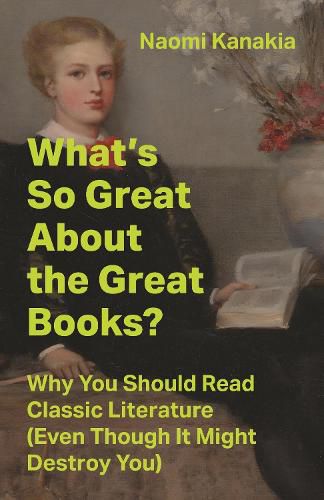Readings Newsletter
Become a Readings Member to make your shopping experience even easier.
Sign in or sign up for free!
You’re not far away from qualifying for FREE standard shipping within Australia
You’ve qualified for FREE standard shipping within Australia
The cart is loading…






A popular novelist and literary blogger answers those who claim the classics are toodifficult, too problematic, and too white-and explains what we gain by reading them
When she was in her early twenties, then-aspiring writer Naomi Kanakia set out to read the Great Books-humankind's most highly regarded literary classics, representing "the best that human beings have thought or said," as determined by the two elderly intellectuals who'd written the guidebook she consulted. After twenty years, she has made her way through about two-thirds of these books, and she's found reading them to be an immensely pleasurable and insightful activity. Plato, Milton, Tolstoy, Proust, all those dead guys-their books have stood the test of time.
But since beginning her journey, Kanakia has found that although reading the Great Books is part of a longstanding tradition of engaging with the thought of previous generations, it is also a highly contingent activity that arose out of a specific time and place, the brainchild of a small group of early twentieth-century popularizers associated with Columbia University and the University of Chicago. And people have always been skeptical about the idea of reading the Great Books, asking if this is truly a realistic or even desirable goal for the ordinary person. A more recent and growing group of Great Books skeptics asks if these works are too problematic, reactionary, and irrelevant to bother reading. Kanakia, a self-described "left-of-center person," grapples with these objections, attempting to restore context for the Great Books even as she sticks up for them. Because books that expose us to fundamental truths about the nature of beauty and reality are worth fighting for.
$9.00 standard shipping within Australia
FREE standard shipping within Australia for orders over $100.00
Express & International shipping calculated at checkout
Stock availability can be subject to change without notice. We recommend calling the shop or contacting our online team to check availability of low stock items. Please see our Shopping Online page for more details.
A popular novelist and literary blogger answers those who claim the classics are toodifficult, too problematic, and too white-and explains what we gain by reading them
When she was in her early twenties, then-aspiring writer Naomi Kanakia set out to read the Great Books-humankind's most highly regarded literary classics, representing "the best that human beings have thought or said," as determined by the two elderly intellectuals who'd written the guidebook she consulted. After twenty years, she has made her way through about two-thirds of these books, and she's found reading them to be an immensely pleasurable and insightful activity. Plato, Milton, Tolstoy, Proust, all those dead guys-their books have stood the test of time.
But since beginning her journey, Kanakia has found that although reading the Great Books is part of a longstanding tradition of engaging with the thought of previous generations, it is also a highly contingent activity that arose out of a specific time and place, the brainchild of a small group of early twentieth-century popularizers associated with Columbia University and the University of Chicago. And people have always been skeptical about the idea of reading the Great Books, asking if this is truly a realistic or even desirable goal for the ordinary person. A more recent and growing group of Great Books skeptics asks if these works are too problematic, reactionary, and irrelevant to bother reading. Kanakia, a self-described "left-of-center person," grapples with these objections, attempting to restore context for the Great Books even as she sticks up for them. Because books that expose us to fundamental truths about the nature of beauty and reality are worth fighting for.